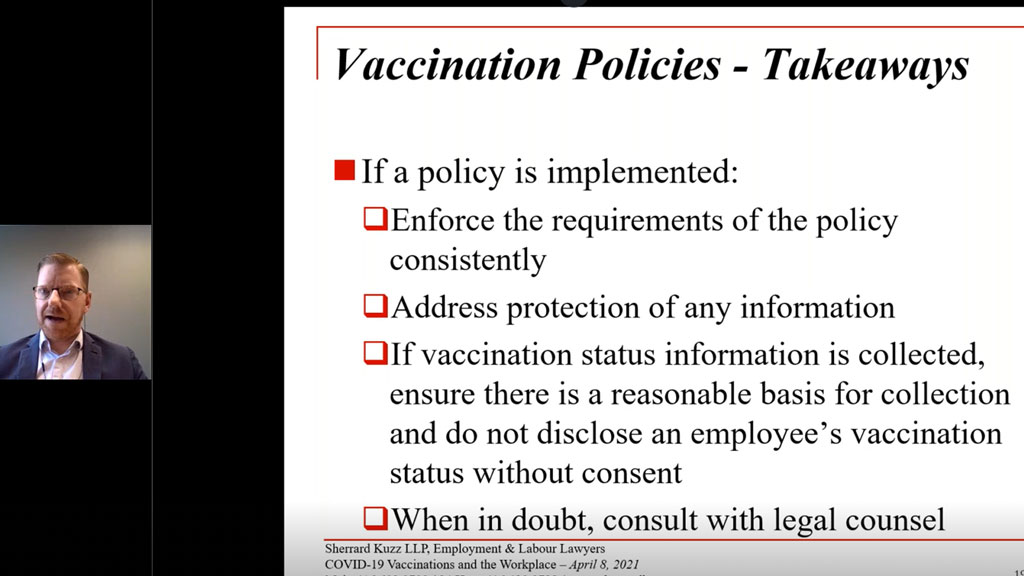Employers need to be cautious if they choose to implement a mandatory vaccination policy in the workplace and whether or not they can successfully implement one will depend on several factors, said Keith Burkhardt of Sherrard Kuzz LLP.
Burkhardt was the guest speaker during the Ontario Road Builders’ Association’s COVID-19 Vaccinations and the Workplace webinar.
“When it comes to vaccination policies and their implementation, there’s a lot of this that is very brand new to us,” said Burkhardt.
“An employer can implement a vaccination policy, but you really do need to consider some of the risks, some of the liabilities that may come into play. You oftentimes can mitigate those risks that you have and address any concerns or legal impediments at the front end.”
Human rights and privacy considerations
While there are health and safety benefits to having a mandatory vaccination policy in place, there are also potential challenges particularly with respect to human resources, human rights and privacy.
“People seem to feel very strongly about this vaccine,” he pointed out. “It is something that you ought to be cautious of or think about as you consider rolling it out in your workplace.”
For example, what happens if you force employees to get the vaccination and they have an adverse reaction?
“They may say, ‘well, the only reason I got this was because of my employer,’ ” Burkhardt explained. “You may see a WSIB claim coming out of that. The federal government has said that they will create a Vaccination Injury Compensation Program. We know none of the details about it.”
What do you do about employees who say they are unable to get a vaccine as a result of a disability or their religion?
“It would be very similar to what you would see traditionally with any other type of disability, religious or other claim under the Human Rights Code,” he said.
“Your accommodation for that individual could be that you actually just have a blanket exception for them from the policies. You could instead reassign them to a role where mandatory vaccination is not a bona fide occupational requirement.”
Union versus non-union
If you have a union in place, Burkhardt recommends asking the union for their input as the policy is being developed.
“Getting their buy in, obviously, is probably easier on the front end, than having to fight on the back end,” he noted. “If you don’t have the union’s consent, there’s something called the KVP test which says an employer can unilaterally implement a workplace requirement or a workplace rule.”
The test has six criteria: the policy or rule must be consistent with the collective agreement; it must be reasonable; it must be clear and unequivocal; it must be brought to the attention of the employees; it must be that an employee understands the consequences for a breach of the policy; and it needs to be consistently enforced.
“That’s for any rule that you have in the workplace,” Burkhardt pointed out. “Whether it’s using cellphones in the workplace, an attendance policy, an alcohol testing policy or a COVID vaccination policy that you have, it needs to meet the KVP test. If it doesn’t, a union could claim that the policy is not enforceable or that the consequences of it should not be enforceable.
“The net result is, it will be difficult outside of a health care facility to successfully implement a mandatory vaccination policy,” Burkhardt added. “My guess, at this point in time, is you’re going to be hard pressed to fit it into a construction setting.”
From a non-union perspective, employers have much broader discretion to implement a policy and don’t need to worry about the KVP test or a collective agreement, he noted.
“You really are only stuck with human rights considerations,” Burkhardt said. “If you have a new hire, you can say, ‘I will only hire you if you have been vaccinated and I need proof of that,’ and that would be similar to, you may have a requirement for a driver’s license.”
Compliance is critical
What happens if they don’t comply?
“If the answer is nothing, then the question becomes, why implement the rule in the first place?” Burkhardt asked. “If you’re going to say ‘I’m going to terminate this individual’s employment,’ you can do that in the non-union workplace…but you need to understand that that person’s entitlement to Statutory or Common Law Notice of Termination or pay in lieu of notice is likely going to exist. I think it would be very unlikely for a judge, particularly in a construction workplace, to say that if someone refuses to get vaccinated, that becomes cause for termination.”
The best thing is to get voluntary or willing compliance by employees, he added.
“Talk to people, educate them, have some of the hard discussions about it,” said Burkhardt. “Then notify employees as soon as possible. Give them as much lead time into it and educate them on the policy. It’s not simply, here’s the policy, comply with it.”
It’s also a good idea to consult with your legal counsel when putting policies in place, he concluded.
Follow the author on Twitter @DCN_Angela.







Recent Comments